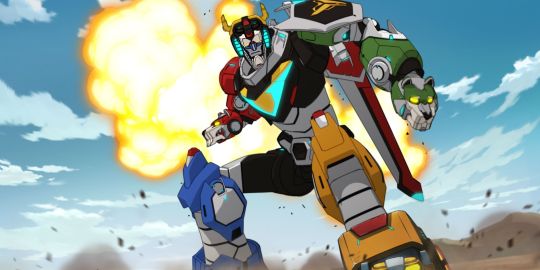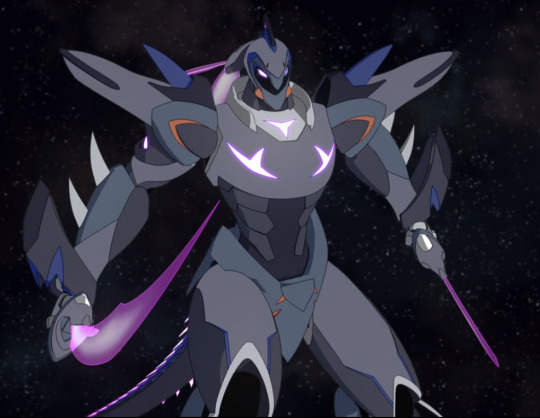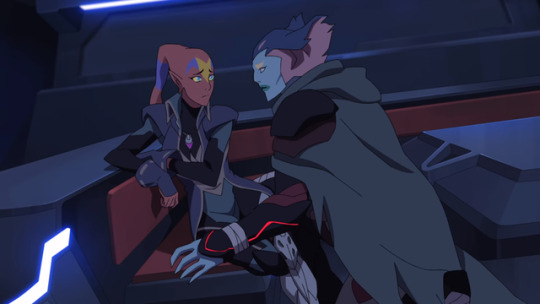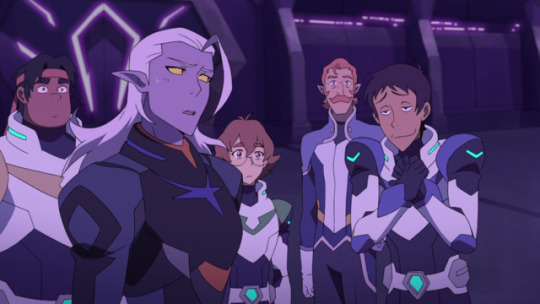#Ezor's being quite literally able to spit acid
Note
In your recent post about the hypothetical Sincline ships, you mentioned certain roles(Mediator, Herald, Mystic, etc.) that each ship's paladin fulfills. Could you maybe elaborate a bit more on each of these? The concept of a sort of "Alt Five Archetypes" so to speak intrigues me.
I mean, they’re not so much an alternate five archetypes as much as, I like the idea that Black and White, for example, would have the same archetype- they’re the head and they would both align with the concept of the Paragon, but, they would call to different things, to the point that they’re not quite interchangeable. So Lotor could work with the Black Lion, and probably better than with any other Voltron Lion- Shiro could work with White Lion, and probably better than with any other Sincline Lion- but Black and White are not the same, they call for different things.
Black, is in many ways, a champion in the light, obstinate in the face of any who would subjugate or ask them to hide themselves. You can see this in both Shiro and in Zarkon- these are people that when the world tells them to move they dig their heels in and say “no.” They assert their strength of will and their personal power by doubling down on resolve- any time the going gets tough they get more stubborn. It’s a very direct sense of values.
And that’s not to say Lotor never challenges people, never confronts- if anything, we see that even outside of structured theses where he absolutely dismantles someone else’s morals, Lotor can and will often take passing shots of judgment at people he dislikes, such as while convincing Zarkon he’s not up to anything in s4e3, Lotor subtly digs at how obviously Zarkon is neglecting him.
But it’s what Shiro and Lotor did to survive that differentiates them.
Shiro was the person who buckled down and held onto his ideals in a setting that was doing everything it possibly could to strip him of himself, to make him a tool of the empire- when his name was ignored he, in effect, made a new one for himself, and kept pushing, kept fighting. When Shiro the Astronaut was taken into the empire, Shiro the Champion forged himself as something that they wouldn’t tame.
In a way, Lotor also kept his sense of self alive under incredible pressure. However, that doesn’t become a name spoken at a reverent roar, and the one time it does seem to gain acclaim in s3e1, Lotor calmly suggests that means nothing- their acknowledgement is shallow and will easily go.
Where Shiro is in a way, the visionary in the light- someone who lacks a certain amount of artifice- Lotor is the conspirator in the dark. It doesn’t matter if a thousand people don’t hear him- if anything, that’s how he prefers it. He shows the sides of himself that need to be seen in that moment, and Lotor at his most sincere is Lotor in private, with only the people he wants in his inner circle.
So this made me imagine White as, in some ways, an illusionist. Drawing strength from charisma, manipulating attention, focus, what happens where your enemies can see you and what happens in the dark. Light, but light as blinding, bewitching, misdirecting.
And in another sense, White still embodying the Head, the Leader- again, in the sense that if you look where Lotor shines at his most earnest and authentic it’s when he is alone in company he completely trusts. Just like a Black Paladin, we see that Lotor’s downfall is isolation, that in some ways he seems the strongest of the team and in others he is the most dependent on the limbs to support and guide him.
From there, that creates an obvious interesting relationship with Cyan as the Right Hand. The Black Lion doesn’t really need anyone to announce it in the slightest so Red if anything takes kind of a deferential position as we see through Keith and through Alfor- Red in a way hangs back and supports Black, to rush in during their time of need.
But if we characterize White as an entity who in some ways obscures their own brilliance, it creates an interesting since that Cyan is the one who brings White into the light, that illuminates the importance of her beloved leader. Both to others- (s3e2, “You dare speak to Prince Lotor?”) and to that leader themselves, when the White Paladin might be lost to the darkness they survive in- this isn’t who you are.
In that sense, Pink becomes the counterpart, the left hand, who expresses their loyalty not by pulling White out of the darkness as-needed, but, as the one who accompanies White through the darkness. Speaking technically, while this is because of Narti’s somewhat rude dismissal from the plot, Narti is the one paladin we never see turn on Lotor in any way. As Ezor says, she trusts him.
And that implies that in some ways, while Acxa obviously takes a sense of importance and relevance from following Lotor, and in s7 seems to describe herself as lost without him (that she had to separate from her other Sincline pilots to find her own path again)...
Narti expresses that same sense of loyalty, of being a Hand, by shadowing Lotor closely. She’s literally the person he calls on to watch his back when he’s summoned for a direct confrontation by Zarkon.
(which further plays into the ideas I have about the White Paladin- Lotor doesn’t hate confrontations, but overwhelmingly Lotor reacts to someone else’s confrontation- in s3e1, Throk was planning something and Lotor merely baited it into the open, in s3e3 Keith chases Lotor first, and Lotor cheerfully demurs keeping up the attack because it’s not the “day of our choosing”. In s5e2, both Black Paladins in a way are open about this confrontation- Zarkon orchestrates it, and Shiro arms Lotor. But the entire time leading up to the fight, Lotor is stonefaced, almost seeming resigned, and that’s how he remains afterwards- he doesn’t relish confronting Zarkon directly, merely acknowledges it as something that needed to be done.)
With Orange and Blue, since the nature of the Blue Lion is mutability and versatility, I would imagine Orange and Blue are the closest to each other. Roughly, I think what differentiates both of the Sincline Legs from Voltron is the sense that Sincline’s legs are more aggressive.
Ezor, the emotional side of the protection is the one who speaks frankly and calculatingly about the future of the team, and it is a very, very grim summation for Sincline indeed when Ezor actually says she’s given up trying to understand Lotor, when in s3, them happy and together, we see that Ezor makes a lot of effort to keep up with what Lotor is thinking.
I imagine in a healthier scenario, with Sincline moving towards apotheosis as a team rather than falling apart, Ezor would be the one most likely to confront and challenge Lotor when he’s withdrawing away from the team, for the same reasons she was the one to first consider pulling away from him after Narti’s death- because she can look frankly at the psychological climate and go “we’re not gonna survive like this.”
The biggest difference between Ezor and Lance- and by connection, Orange Lion and Blue Lion- is that we see Ezor ply her emotional savvy aggressively. Probably the clearest example is in s7- she easily skims the paladins, notice who’s in the most protected position, Pidge, and who as soon as she looks at Pidge, the other paladins start giving her death glares- and she knows immediately that threatening Pidge is going to get her the most leverage the fastest. In s3e2 she does similar things with the Puigian leader, taunting him and baiting him into getting sloppy.
And that makes sense. The Legs are those concerned with protecting the team, with seeing their allies as a mouth to feed, an injury to bandage, needs that call for redress.

And the biggest difference between Sincline and Voltron is Voltron is a proud champion of the light, a knightly figure of a bygone age, born during peace and a harbinger of hope. Powerful, shielded, closely entwined with this sense of honor, and overwhelmingly, carrying a tower shield and a shining sword.

Sincline is a bandit, not because of a lack of values- because again, I imagine each piece of Sincline embodies much the same values as its corresponding piece of Voltron- but because if you have been starving for years, honor won’t feed you. Sincline did not streak across the sky and deliver itself as a shining beacon of potential to a court of lords. It was born during wartime, it panicked and hid itself; it waited centuries, powerless in the darkness, nestled in a trap it had created to keep itself safe and tear apart any unworthy that might approach it.
There’s a reason Sincline resonates with Lotor and the generals. It’s because they themselves, are fearful, cornered people. They’re not spineless or morally deficient compared to Voltron- but it’s easy to be a knight in shining armor when you have the money to afford the suit and a polishing kit. It’s easy to say that you want to not merely save people, but do so as a moral inspiration, when you have the luxury of not having to choose between the two.
So much of Lotor’s argument with Voltron at the end of s6 basically boils down to “you don’t understand because you were safe. You were safe, and comfortable, because you had people who loved you and hid you from the fire and the wolves at the door. I did what I did because while you were safe, I was out here, with the cold and the beasts, and I did what I had to because I needed to eat.”
So there’s a vein of not ruthlessness or depravity to Sincline, but of desperation. In peace and in plenty, Sincline is just as honorable as Voltron. But it doesn’t forget famine, because it can’t forget them- because it remembers that, and because that echoes in the heart of its chosen paladins. They remember what it feels like to starve, and that memory starts to gnaw on them when food runs low.

And in some ways, that would resonate most in the leg pilots- in Orange who is very versed in fear, in uncertainty, in “can we make it? Can we keep going like this? Should we be hoping in the future or should we be making sure we have somewhere to run to?”-
And in Indigo, counterpart of Yellow, the team’s shield, who knows that while she might stock heavily in armor and strength, that she’s going to need to stay there and keep holding that defensive line even well past the point that it will hurt her. Hence why Yellow Lion is the Guardian, but Indigo Lion is the Martyr- not that she lacks the resolve to live in any sense, but in a way, Sincline is shaped by the sense that you can’t guarantee everyone will make it, and if you want to try, the best thing to do is to make a decision that if only four people can go home, you won’t waste time deciding before you push your friends to safety.
Though, that sense of Sincline as born out of want, out of necessity, out of fear would ring through all of them- it’s the significance of Cyan’s focus on Honor specifically because as the counterpart to Red, the visionary, Cyan is the one who looks towards that image of gleaming heroes in armor and says “we could get there, I believe in you. You’re worthy of those honors, too. I won’t let anyone forget it.”
It’s the significance of how Pink expresses her curiosity, her focus on knowledge and information- nobody, nobody sneaks up on Sincline on Pink’s watch. Which is, incidentally, the exact reason why in my original post I gave Pink the power to sense and disable cloaked targets- not only does it set her up as a nice rival to Green that way, but it enforces the idea that in canon, the beginning of Sincline’s end was losing Narti- because she’s the team’s vanguard, and from that point on, they had to operate blind.

And it’s the significance of White as a leader who, no matter how charismatic and clever, is not really comfortable being seen as themselves. While it was so brief, I really think it means a lot that in s6 we see that Lotor in an actual comfortable equal-footing environment with the paladins rapidly turns a bit sheepish and cautious- because Lotor’s most comfortable being seen when it’s an image he’s projecting, and it is a very rare currency of absolute trust when he actually lets his shields down, and he wasn’t quite there with many of the paladins yet.
While it’s funny to see Lotor blushing a little at Lance’s enthusiastic clowning, it comes back to the unfunny root that this is because, for most of his life, Lotor has not felt safe being who he is. He has to know he can trust people before he shows his hand. And that tying thematically into how I imagine the White Lion, as a counterpart to Black with that heavy focus on Identity and Self- but White is the concealed, protected Self that refracts itself through mirrors to become power.
#voltron legendary defender#vld#Lotor#Acxa#Narti#Ezor#Zethrid#Sincline#readmore#a lot of this was in the back of my head making the first post#the significance of Zethrid having a Lion that not only tanks hits but specifically can tether a foe onto itself#Ezor's being quite literally able to spit acid#Acxa's as 'burning brightly'#Lotor's as able to manipulate attention on itself and away from itself#Narti's as an inescapable blind eye#Anonymous
94 notes
·
View notes